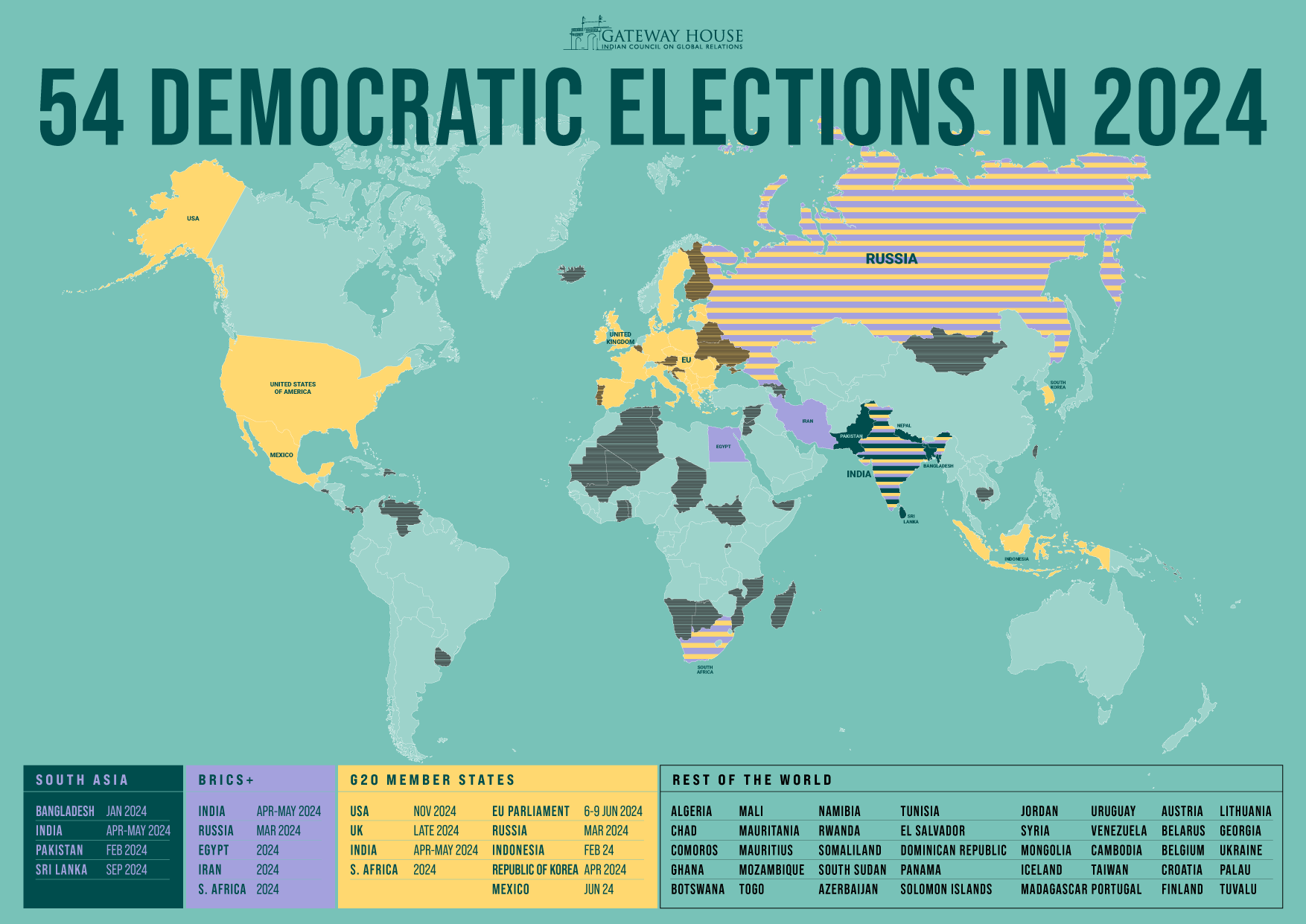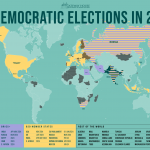Twenty twenty-four will see a sweep of over 50 democracies across the world hold general elections. The electoral campaigns are being fought over a combination of new and old issues, both domestic and international. The backdrop of these polls is a receding post-war, West-led order, the on-going aftermath of the Covid-19 pandemic, food and energy crises exacerbated by the Russia-Ukraine conflict and the fallout from the recent outbreak of the Israel-Hamas conflict in West Asia.
The map shows key elections scheduled for 2024. Seven of the world’s 10 most populous countries are scheduled to vote through the year. Across Asia and the Indo-Pacific, a spate of democracies will elect new leaders. For India, these contests come in clearly defined global configurations: nearly half of the G20 member states will in 2024, along with five of the expanded-11-member BRICS. Closer to home, most of the South Asian region will vote between January and September.

The first in the South Asian cycle is Bangladesh’s parliamentary contest scheduled for January 7. The campaign, marked by violence and allegations of repression, has been closely watched – as will the election, which opposition Bangladesh National Party says it will boycott. The India-Bangladesh bilateral has blossomed in the past decade, and a stable Bangladesh is critical to India’s Look East Policy and security in its own Northeast region.
Contests are similarly fraught in Pakistan and Sri Lanka. The former faces a series of challenges from economic uncertainty to insurgency, its most popular leader being denied a nomination by the Election Commission of Pakistan. Sri Lanka will head to the polls later this year, and the debt default that pushed the country into its worst economic contraction since independence, will be a hot-button electoral issue. Long-term recovery in either country is contingent on political stability.
Given the number of countries slated to vote, foreign policy is also on the ballot, and the promises are being kept. The winning candidate in New Zealand’s October election, Christopher Luxon, campaigned on closer relations with India. Since his election, the respective commerce ministers have met and are actively pursuing their agenda. In Argentina, Javier Melei the candidate vowed a rethink on Argentina joining BRICS – a promise that was kept when he became president.
Expect the same in 2024. The campaign in the U.S. has been shaped by the country’s involvement in the Russia-Ukraine crisis, the Indo-Pacific and, more recently, its response to the Israel-Hamas conflict. Ukraine’s planned polls in March have been deferred. Elections to the European Parliament will likely focus on the detrimental fallout of the Russia-Ukraine war on European economies. In Asia, Taiwan’s the January 13 election will be keenly followed, their outcome dependent the status of the soaring tensions between the U.S. and China in the Indo-Pacific, which is now a potential flashpoint between the two superpowers.
India has conventionally been part of the electoral discourse among its neighbours in South Asia, but its rising profile and attractiveness as an investment destination has made it a serious talking point in global elections too.
In the U.K., Prime Minister Rishi Sunak’s electoral star will shine better if he concludes a trade deal with India. The expanding bilateral with Washington, will certainly be a positive in the elections, given how fraught the U.S.’ non-G7 relationships have become. Accompanying India, the baton-carrier for the Global South, will infuse some optimism into a cynical election campaign.
India’s own elections, which come on the heels of a successful year-long G20 presidency and a rising global profile, are also likely to see the emergence of foreign policy as a mass issue.
Three major blocs will have new leaders in 2024: four in South Asia, nine of the G20, five of the BRICS-plus. India has an interest in all three groupings: its own national election and its impact on its neighbourhood and vice versa; in the G20, of which India is still part of the troika and has to see through its ambitious commitments; in BRICS-plus, where a new global game is afoot.
Charuta Ghadyalpatil is a Research Assistant, Gateway House.
Infographic designed by Debarpan Das.
This infographic was exclusively designed for Gateway House: Indian Council on Global Relations. You can read more exclusive content here
Support our work here.
For permission to republish, please contact outreach@gatewayhouse.in
©Copyright 2024 Gateway House: Indian Council on Global Relations. All rights reserved. Any unauthorised copying or reproduction is strictly prohibited.


